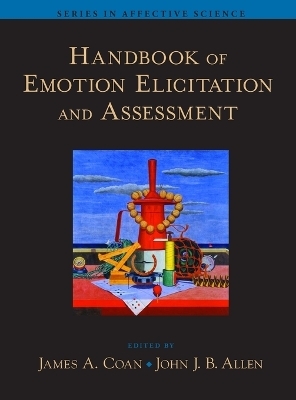
Handbook of Emotion Elicitation and Assessment
Oxford University Press Inc (Verlag)
978-0-19-516915-7 (ISBN)
Emotion research has become a mature branch of psychology, with its own standardized measures, induction procedures, data-analysis challenges, and sub-disciplines. During the last decade, a number of books addressing major questions in the study of emotion have been published in response to a rapidly increasing demand that has been fuelled by an increasing number of psychologists whose research either focus on or involve the study of emotion. Very few of these books, however, have presented an explicit discussion of the tools for conducting research, despite the facts that the study of emotion frequently requires highly specialized procedures, instruments, and coding strategies, and that the field has reached a place where a large number of excellent elicitation procedures and assessment instruments have been developed and validated. The Handbook of Emotion Elicitation and Assessment corrects this oversight in the literature by organizing and detailing all the major approaches and instruments for the study of emotion. It is the most complete reference for methods and resources in the field, and will serve as a pragmatic resource for emotion researchers by providing easy access to a host of scales, stimuli, coding systems, assessment tools, and innovative methodologies. This handbook will help to advance research in emotion by encouraging researchers to take greater advantage of standard and well-researched approaches, which will increase both the productivity in the field and the speed and accuracy with which research can be communicated.
James A. Coan is an Assistant Professor of Psychology and the Neuroscience Graduate Program at the University of Virginia, in Charlottesville. His research focuses on the neural systems supporting emotional communication and regulation, with an emphasis on the roles these systems play in psychopathology and interpersonal relationships. John J. B. Allen is Distinguished Professor of Psychology, Cognitive Science, and Neuroscience at the University of Arizona, in Tucson. His research interests include the etiology and treatment of mood disorders.
I EMOTION ELICITATION ; 1. Emotion Elicitation Using Films ; 2. The International Affective Picture System (IAPS) in the Study of Emotion and Attention ; 3. The Directed Facial Action Task: Emotional Responses without Appraisal ; 4. Emotional Behaviors As Emotional Stimuli ; 5. Probing Unconscious Emotional Processes: On Becoming a Successful Masketeer ; 6. Social Psychological Methods of Emotion Elicitation ; 7. Emotion Elicitation Using Dyadic Interaction Tasks ; 8. Combining Music with Thought to Change Mood ; 9. Emotion Elicited by Primary Reinforcers, and Following Stimulus-Reinforcement Association Learning ; 10. Emotion Elicitation with Neurological Patients ; II EMOTION ASSESSMENT ; 11. Assessing Positive and Negative via Self-Report ; 12. The Information-Processing Approach to Emotion Research ; 13. Observer-Based Measurement of Facial Expression with the Facial Action Coding System ; 14. Use of Automated Facial Image Analysis for Measurement of Emotion Expression ; 15. Measuring Emotion-Related Vocal Acoustics ; 16. The Specific Affect Coding System (SPAFF) ; 17. Continuous Measurement of Emotion: The Affect Rating Dial ; 18. Assessing Understanding and Appraisals During Emotional Experience in Everyday Life Situations ; 19. The Time Sampling Diary (TSD) of Emotional Experience in Everyday Life Situations ; 20. Methodological Considerations in the Study of Emotion Across Cultures ; 21. Considerations in Studying Emotion in Infants and Children ; 22. Conceptual, Theoretical, and Methodological Issues in Inferring Subjective Emotion Experience: Recommendations for Researchers ; III METHODS FOR UNDERSTANDING THE BIOLOGICAL BASES OF EMOTION ; 23. Studying Emotion in Animals: Methods, Materials, and Training ; 24. The Psychophysiological Laboratory ; 25. Investigating Human Emotion With Lesions and Intracranial Recording ; 26. Functional Magnetic Resonance Imaging and the Study of Emotion
| Erscheint lt. Verlag | 7.6.2007 |
|---|---|
| Reihe/Serie | Series in Affective Science |
| Zusatzinfo | 97 illustrations |
| Verlagsort | New York |
| Sprache | englisch |
| Maße | 282 x 218 mm |
| Gewicht | 1367 g |
| Themenwelt | Geisteswissenschaften ► Psychologie ► Allgemeine Psychologie |
| Geisteswissenschaften ► Psychologie ► Test in der Psychologie | |
| Geisteswissenschaften ► Psychologie ► Verhaltenstherapie | |
| ISBN-10 | 0-19-516915-8 / 0195169158 |
| ISBN-13 | 978-0-19-516915-7 / 9780195169157 |
| Zustand | Neuware |
| Haben Sie eine Frage zum Produkt? |
aus dem Bereich


